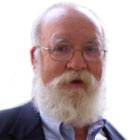 In a May 2014 Santa Fe workshop, Daniel Dennett defended the meme as follows:
In a May 2014 Santa Fe workshop, Daniel Dennett defended the meme as follows:
The popular hijacking of Dawkins’ term “meme” for any cultural item that “goes viral” on the Internet, regardless of whether it was intelligently designed or evolved by imitation and natural selection, has been seen by some to subvert the theoretical utility of the term altogether. There is also the unreasoned antipathy the term evokes in many quarters (reminiscent of the antipathy towards the term “sociobiology” that led to its abandonment). Alternatively, if one is “Darwinian about Darwinism” we should expect the existence of cultural items that are merely “memish” to one degree or another, and we might as well go on using the term “meme” to refer to any relatively well-individuated culturally transmitted item that can serve as a building block or trackable element of culture however it arrives on the scene. Other terms, such as Boyd and Richerson’s “cultural variant”, have been proposed, but the term “meme” has become so familiar in popular culture that whatever alternative is used will be immediately compared to, identified with, assimilated to meme(a Sperberian attractor, apparently), so perhaps the least arduous course is to adopt the term, leaving open its theoretical definition, in much the way the term “gene” has lost its strict definition as protein-recipe in many quarters. Since the long-term fate of such an item will be settled by differential reproduction (or something similar to differential reproduction) however much insight or “improvisational intelligence” went into its birth, it has a kind of Darwinian fitness.This seems like a rather weak defense to me - it leaves open the reply that: all kinds of nonsense is sometimes popular - but that doesn't make it scientific.
The sheer popuarity of term "meme" is obviously a big factor in its rise - but the failure of its opponents to come up with a coherent technical critique is surely another significant factor. If there were genuine scientific reasons for not adopting the term "meme" that would be one thing - but the attacks of critics on the meme terminology miss the mark so widely, that it is hard to take them seriously. I for one would not endorse the adoption of the term on grounds of popularity if such a course of action was not scientifically correct.
Of course, there are also many positive reasons for adopting the term - but these may overlap with the reasons for its popularity.
Commentaries:
The commentary contains relatively little enlightened discussion of memes - except for by Susan Blackmore. However, Peter Richerson has some good things to say on the topic. In particular, he says:
I don’t have a big problem with the concept of memes so long as the meme-gene analogy is not excessively rigid. Susan assures is that Rob’s, Joe’s and my old fears in this regard are unfounded.
That sounds good! This, however, does not sound so good:
I have qualms about the concept of universal Darwinism. Culture/memes are a lot like genes in some respects and not like them in others. I see a shallow analogy where others seem to see a fundamental law-like similarity.
I am definitely in the "law-like similarity" camp. Darwinism: it's not just a good idea - it's the law.










No comments:
Post a Comment